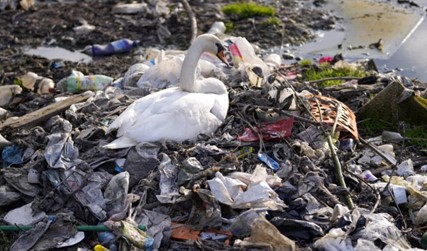
Today Marks Plastic Overshoot Day: A Global Treaty Could Help Combat the Plastic Waste Crisis
Did you know that over 220 million tons of plastic waste are expected to be produced in 2024? Today, September 5, marks Plastic Overshoot Day—the point where the world's plastic waste surpasses the capacity of waste management systems to handle it.
According to a report by Swiss NGO Earth Action, released in 2024, 66% of the global population now lives in regions where plastic waste exceeds local waste management capabilities. This alarming statistic is revealed just ahead of key negotiations in South Korea this November, where discussions will focus on establishing a legally binding international treaty to tackle plastic pollution.
At the upcoming event, Earth Action will partner with corporations and global leaders to advocate for this vital treaty.
How severe is the global plastic waste issue?
Currently, 12 countries are responsible for 60% of the world's mismanaged plastic waste, with the leading contributors being China, Russia, India, Brazil, and Mexico. On a global scale, the average person generates around 28 kilograms of plastic annually—a figure that has grown by 7.11% since 2021.
The planet simply lacks the capacity to handle the growing volume of plastic. Earth Action's report estimates that one-third of this plastic will be mismanaged, leading to 69.5 million tons of waste entering natural ecosystems.
What insights did the report provide on plastic waste?
This year's report expanded its scope to include plastic waste from textiles and households, in addition to the previously focused plastic packaging. Despite slight improvements in waste management, Plastic Overshoot Day only shifted from September 4 to September 5. This stagnation is due to the relentless rise in plastic production. Essentially, this leaves 117 days in 2024 where plastic waste is expected to be mismanaged globally.
Properly managed plastic, according to the report, involves methods that reduce environmental impact—mainly through recycling, cutting down on plastic usage, and designing materials for better recyclability. But Earth Action warns that any progress in waste management is being overshadowed by the increasing production of plastic. The notion that recycling alone can resolve the plastic crisis is seen as deeply flawed.
"Plastic Overshoot Day highlights both our current trajectory and the urgent need for action. The choices made today will have lasting effects on ecosystems and economies for generations," says Sarah Perreard, Co-CEO of Earth Action and the Plastic Footprint Network. She stresses that a "business-as-usual" approach will only worsen the plastic waste problem.
What are the solutions to the plastic waste crisis?
Perreard argues that addressing plastic waste is essential for protecting both the environment and human health. Additionally, failing to act could hurt businesses, with profit margins and sustainability both at risk. Many companies, including small and medium-sized enterprises (SMEs), are now working to account for their plastic footprint and integrate circularity into their supply chains.
The proposed UN Treaty would be the first of its kind, aiming to reduce unnecessary plastic production, ban certain harmful chemicals, and set ambitious recycling targets.
Earth Action collaborates with international companies, governments, and SMEs to evaluate the impact of plastics across supply chains and support a transition toward circular business models. The organization also founded the Plastic Footprint Network, which includes over 35 global partners like Decathlon, WWF, Mars, and Breitling.
Nicolas Rochat, founder of Mover Plastic Free Sportswear, emphasized the urgency of the situation: "Today serves as a stark reminder that the time for change is now. Three-quarters of the year has passed, and we've already surpassed our capacity to manage plastic waste. Continuing down this path is a threat to both businesses and humanity."
"So-called solutions like recycling will only increase both physical and chemical plastic pollution. It's time to go beyond temporary fixes and invest in sustainable alternatives that will future-proof us against the looming crisis," he added.
"Our planet can no longer afford the cost of inaction or the consequences of perpetuating this problem."